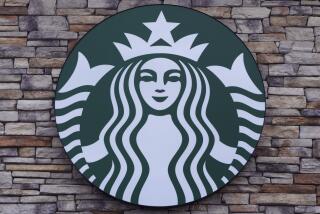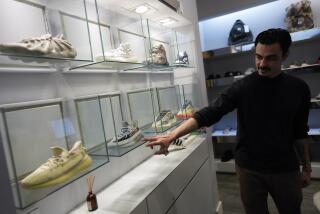ADVERTISING & MARKETING : Levi Strauss Taps Pepsi Marketer to Revive Brand : Apparel: Philip Marineau will become chief executive of the jeans maker, which is struggling with declining sales.
- Share via
Levi Strauss & Co., building on changes the company began last winter in hopes of reviving its famous but sagging brand, hired away top PepsiCo Inc. executive Philip Marineau to become president and chief executive.
In almost two years as president of Pepsi’s North American beverage unit, Marineau won accolades for his marketing prowess and ability to cultivate suppliers--two talents the privately held San Francisco clothing company badly needs, analysts said.
Levi, known for its signature Levi’s jeans and other denim apparel as well as Dockers and Slates slacks, had been seeking a new president to improve its marketing for eight months.
“Marineau has made a very fine reputation as a marketer,” said Kurt Barnard, a retail consultant and president of Barnard’s Retail Trend Report. “The stepping aside of Bob Haas is clear acknowledgment the company needs new ideas.”
Haas, who remains chairman, has been Levi’s chief executive since 1984. His family controls the apparel maker and his father, Walter, also was the company’s chief executive.
The pioneer of the jeans industry, Levi has watched its namesake brand lose ground to trendier alternatives from Gap Inc. and Tommy Hilfiger Corp., which were quick to catch on to young consumers’ demand first for wider-leg denim styles, then cargo-pants shapes. Less fashion-conscious Levi customers, on the other hand, began buying lower-priced private-label jeans at J.C. Penney, Wal-Mart and other discount stores.
Meanwhile, revenue at Levi, which began making jeans for gold miners in 1887, fell 13% to $6 billion in fiscal 1998--well off the 1996 peak of $7.1 billion. Levi has said it wants to focus on designing and marketing products, as shoemaker Nike Inc. has done, rather than production.
“Mr. Marineau is highly regarded as a talented brand builder and an innovative leader with a track record of expanding market share in competitive environments,” Levi said in a statement Tuesday. “He has the experience we need and a relentless focus on flawless execution in every facet of the business, from product and marketing innovation right through to consumer satisfaction.”
Levi retains market leadership for a single brand, but its 25% share of the U.S. jeans market is roughly half what it was in 1990.
In February, Levi said it would shut half its 22 plants in North America and fire 5,900 workers to slash costs as demand for its bluejeans falls. The company has taken other steps to revitalize its business, such as limiting production runs, which “keeps consumers chasing its products,” Leslie McCall, an analyst at Brown Bros. Harriman & Co., told Bloomberg News.
While at Pepsi, Marineau, 52, introduced a new diet soda, Pepsi One, and blue packaging for the company’s flagship Pepsi-Cola soft drink.
Although the new diet soda has been less than a hit with consumers, Marineau hasn’t been tarnished by it because plans for the new drink were in place when he came to Pepsi, said John Sicher, the editor and publisher of Beverage Digest, an industry newsletter.
Under his watch, Pepsi dropped its weak “Generation Next” advertising campaign aimed at teenagers for the “Joy of Cola” slogan, which Pepsi’s bottlers think will generate more sales.
“He wasn’t there long enough to basically chalk up a lot of successes or failures, but certainly he was well regarded by the Pepsi bottlers, certainly well regarded by his colleagues at Pepsi and well regarded by his competitors, quite frankly,” Sicher said.
The onetime Quaker Oats president was regarded as a leading contender to succeed Pepsi’s Chairman and Chief Executive Roger Enrico.
At the same time as he was helping revitalize the Pepsi brand, the North American beverage division’s profit has remained under pressure. Last week, Pepsi announced that concentrate shipments were expected to drop 4% in the third quarter because of price increases.
Before joining PepsiCo, Marineau was president and chief operating officer of Dean Foods Co. Prior to that, he held the same position with Quaker Oats.
During his 23-year career at Chicago-based Quaker, Marineau helped build sales of its Gatorade brand, the world’s best-selling sports drink. He also was at the helm during Quaker’s disastrous acquisition of Snapple.
Although it was unclear how much Marineau had to do with the purchase--he served under a chief executive--he said later that if he had to do it over again, he would make the deal but handle the product differently.
Notes
G.D. Searle & Co. and Pfizer Inc. are launching a print campaign for the blockbuster arthritis drug Celebrex, Reuters reported Tuesday. The ads, by Chicago agency Leo Burnett, ask: “What will you do on the day you discover Celebrex?” Spending wasn’t disclosed . . . Glendale-based IHOP Corp. continues to feature “spokescharacter” Cliff in new ads from San Francisco-based Kirshenbaum & Bond West that emphasize food, a departure from past campaigns that stressed bargains. Billings are estimated at $20 million.
More to Read
Inside the business of entertainment
The Wide Shot brings you news, analysis and insights on everything from streaming wars to production — and what it all means for the future.
You may occasionally receive promotional content from the Los Angeles Times.










